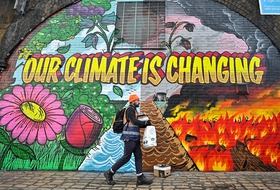
Nearly 100 people have died in the heatwave in India that has badly hit millions of people who work under the blazing sun to earn their livelihood.
Il mese di giugno di quest’anno ha fatto registrare nuovamente un caldo record a livello mondiale, secondo i dati pubblicati dalla Noaa.
Yet another record. Yet another warning for humanity. Last month was the hottest June since records began in 1880, according to the United States’ National Oceanic and Atmospheric Administration (NOAA). Data show that sea and land temperatures were 0.9 degrees hotter than last year’s average, a value 0.02 degrees above the previous record set in 2015.
JUST IN: Globe record warm for 14th consec month (June) – @NOAANCEIclimate https://t.co/8dpMpSrk1a #StateOfClimate pic.twitter.com/fEA20RAc4V
— NOAA (@NOAA) July 19, 2016
Temperatures also broke records in the first 6 months of 2016, with 0.2 degrees above the same period of the previous year and 1.05 above the 20th century average. Moreover, June marks the 14th consecutive month of record temperatures the 40th consecutive June with temperatures at least nominally above the 20th century average.
Siamo anche su WhatsApp. Segui il canale ufficiale LifeGate per restare aggiornata, aggiornato sulle ultime notizie e sulle nostre attività.
![]()
Quest'opera è distribuita con Licenza Creative Commons Attribuzione - Non commerciale - Non opere derivate 4.0 Internazionale.
Nearly 100 people have died in the heatwave in India that has badly hit millions of people who work under the blazing sun to earn their livelihood.
According to data reported by C3S, 2021 was one of the hottest years on record and Europe experienced a summer of extremes.
COP26 ended on Saturday 13th November, one day later than expected. Some positives and many negatives in the Glasgow Climate Pact, weakened by India’s last-minute change.
Governments made announcements, leaders spoke, decisions were made, civil society protested. This is what happened during the first week of COP26.
Reducing emissions means protecting our health: if unmitigated, climate change will pose increasingly severe challenges to human well-being.
The Paris Climate Agreement requires us to move towards carbon neutrality, but what does reducing net greenhouse gas emissions to zero actually mean?
If we want to limit the rise of average global temperatures to 1.5 degrees, we can emit only a limited amount of CO2. This is the carbon budget.
We talk to Shaama Sandooyea, activist and marine biologist from Mauritius onboard Greenpeace’s Arctic Sunrise ship in the heart of the Indian Ocean.
In the heart of Switzerland lies the largest glacier in the Alps, the Greater Aletsch Glacier. However, climate change is threatening its very existence.







